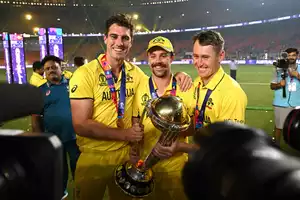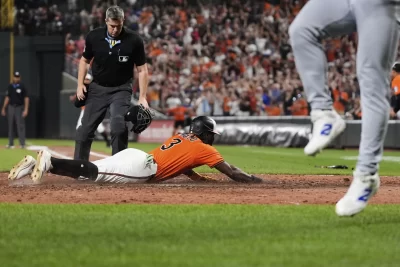
This time last month, Travis Head was back home in Australia watching his team take small steps towards recovery after a shaky start to the ODI World Cup in India. He should’ve been in India too, if not for a fractured left-hand he suffered in the ODI series against South Africa in the lead-up to the showpiece event. The Aussie selectors, however, kept faith in the swashbuckling opener to recover and make it to India at some stage and have the desired impact.
As far as returns on investments go, people behind this decision could not have had it better, as Head achieved what only one other male cricketer had achieved before — scoring a century in a run-chase in an ODI World Cup final. And this came after he got a 48-ball 62 against South Africa in the semifinal just three nights ago. Pat Cummins, his captain, expressed his absolute delight at what Head pulled off on Sunday night and doffed his hat to those responsible for keeping the faith in him and getting him back upto speed.
“I think the unheralded few (are) the selectors that backed him even when he had a broken hand. And the medical team to get him back, there was a big risk we took and it paid off. You couldn’t be happier for Travis, he’s a legend and we love him and how fun is he to watch?” said Cummins after Head’s 137 powered Australia’s sixth ODI World Cup title.
In four of the seven wins they earned in the league stage, Australia set a total. On the big night however, Cummins took a brave call to chase one and it paid off handsomely. Cummins revealed Australia felt batting later would’ve been easier at the venue.
“We were tossing it up [decision to bowl first]. We’ve been batting first pretty much for the whole tournament. Today we thought it was a good night to chase and it might actually get a little bit easier to play. Everyone was pretty keen to get out there,” Cummins said.
Though the pitch was slow and batting was tough, Australia’s ability to restrict India to 240 was down to how well Cummins’s players responded to his decision to bowl first on a slow surface which didn’t take much turn.
“[They were] desperate for sure,” Cummins said of his team’s electric fielding in the opening phase of the game. “I think it all started last week, against South Africa. The boys have been fantastic. We’ve got an ageing side but everyone still throws themselves around when you’ve got a big stadium like this packed.”
“It [pitch] was a bit slower than I thought. It didn’t particularly spin as much as we thought either. I thought everyone adjusted pretty well and bowled outstanding lines. On a slow wicket like that where there is variable bounce, so we thought [of having] a couple of catchers on the leg side. You have to score runs in ODI cricket so you put a couple of catchers there and make them make such decisions,” Cummins opined.
Rahul Dravid and Rohit Sharma admitted India were about 30-40 runs short, but Cummins himself felt restricting the hosts to 300 would’ve been something his side would’ve taken. To have got them out for 60 fewer added another spring to the step of a galloping side. Much of that gallop, however, was halted by India’s new-ball bowling as they had Australia down to 47 for 3 in the seventh over, leaving Australia with a few nerves in the dressing room.
“I was one of those blokes with a heart fluttering upstairs. I was pacing,” Cummins revealed. “Marnus [Labuschagne] walked in out there with a cool head straight away and Trav (Head) does what he does, really brave again, he takes the game on and puts the pressure back on the bowlers. To do it on the biggest stage, shows a lot of character.”
The Australia that got its hands firmly around the World Cup trophy on a glitzy night in Ahmedabad was almost unrecognisable from the one that succumbed to two early defeats – against India and South Africa. Cummins opened up on the ‘real shift’ that occurred once Australia were wounded early in the tournament.
“You’ve got to go and win a World Cup. You can’t wait for it to happen. You’ve got to be brave at times and take the game on. There was a real shift after those first two games, our batting particularly saw the openers go on and be really aggressive. And they pretty much didn’t waver from that for the rest of the tournament,” Cummins said. While Head finished with 329 runs in six innings at a strike rate of 127.51, David Warner got 535 runs in 11 innings at a strike rate of 108.30.
On Sunday, Australia weren’t just up against the form-team of the tournament but also a partisan crowd like nowhere else in a stadium that could seat over 1 lakh 30 thousand people. In waves and waves of blue jerseys and t-shirts, there were barely any specks of yellow whose voice was drowned out by the cheers for the home team.
“I was pretty happy they [crowd] were solid for the bowling innings. A couple of times it got loud and it was really loud. I mean the passion in India unrivalled around the World. Every single person is wearing a blue shirt and you look around and it is a pretty special moment. Whatever the result, we’re never going to forget a day like today,” Cummins felt.
“I think we saved our best for last. A couple of big-match players stood up, we’re pretty chuffed,” he added.
Besides retaining the Ashes, Australia added two ICC trophies – World Test Championship and this World Cup – to their already overflowing trophy cabinet in this year alone. “Crazy. This year will be a year we’ll remember for a long, long time,” Cummins said.






